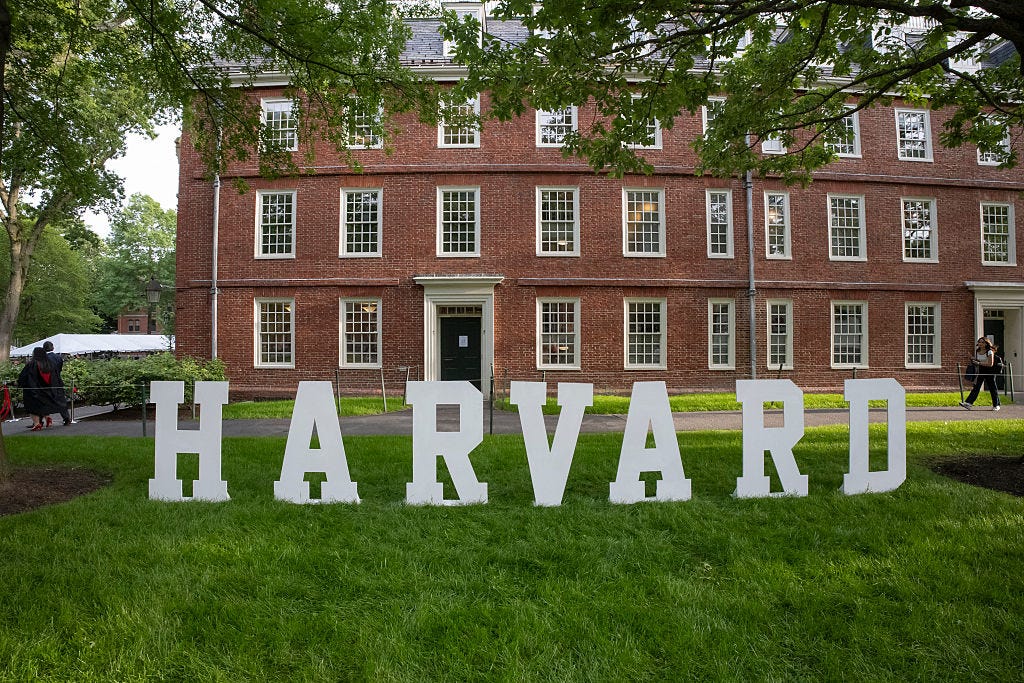Why I Didn’t Sign
An amicus brief from Harvard alums avoids addressing the university’s many failings

Recently, I was one of several thousand Harvard graduates attending the Alumni Day Program in the leafy tourist trap known as Harvard Yard. The total number of attendees was 9,000—a record number, we were told by Atul Gawande, the distinguished physician and author who gave the keynote address.
“I think I know why,” he added wryly, and the crowd cheered, because they—we—felt united in opposition to the clumsy assault being carried out by President Trump against higher education in general, Harvard in particular.
Dr. Gawande’s address was persuasive, not least because he focused on the gutting of several global health initiatives that he had been overseeing at the U.S. Agency for International Development (USAID). That agency was eliminated in March, and unless its funding is restored or replaced, the loss of life, already high, will rise catastrophically. And the damage to America’s reputation—especially among impoverished people in countries where the rulers are too corrupt, incompetent or just plain callous to assist citizens in need—will be incalculable.
When the Alumni Day Program ended, a pair of Harvard alumni organizations called Crimson Courage and Alumni for Democracy resumed their efforts to gather as many signatures as possible for an amicus brief to be filed in Massachusetts federal district court in support of Harvard’s lawsuit challenging the Trump administration’s use of federal research funds as a lever of control.
Later that evening, I read the amicus brief and, despite my dismay at the direction of events, could not bring myself to sign it. Here’s why.
First and least important, it is poorly written. Indeed, it could have been churned out by a chatbot unable to distinguish between lively and deadly sentences. If I am being unfair and the authors are in fact human, they did themselves no favors by reciting the boilerplate slogans of the “University-wide Statement of Values.” These include “conscientious pursuit of excellence,” “integrity in all dealings,” “advanc[ing] the frontiers of knowledge,” “prepar[ing] individuals for life, work, and leadership,” “spaces of trust and mutual respect, free expression and inquiry” and “commitment to truth, excellence and lifelong learning.”
When confronted with a list like this, my mother would make a face and say, “Yes, but can it sweeten the breath and keep the trousers from bagging at the knees?”
The document’s one and only theme is the wonderfulness of Harvard degree holders, all 400,000 of them, as “a vast and vital community of individuals who are improving lives across the nation and throughout the world.” As one of these blessed souls, I should perhaps have felt flattered. But part of me (my brain) kept wondering why these two organizations were defending Harvard in the breathless tones best reserved for a brochure issued by the university’s Public Affairs and Communications Office.
This is not just my opinion. Several of the alums I talked with, from my class and others, said they had intended to sign the brief but after reading it, decided not to. They would prefer, they told me, to see less bragging and more humility—especially in the form of owning up to the glaringly bad impression that Harvard and other elite universities have been making on the general public for the past several years.
Other alums, including a few involved in Crimson Courage, expressed the opinion that if Harvard and its fellow Ivy League schools want to prevail in this battle, they will make sure it is not being fought exclusively by and for the country’s most elite schools. Instead, they should reach out to at least some of the nation’s roughly 5,000 degree-granting universities, colleges, community colleges and professional schools whose budgets, especially with regard to student loans and scholarship grants, are far more vulnerable than theirs. If they fail to do this, Trump will likely get his way.
Meanwhile, the immediate situation calls for a different sort of amicus brief, not to supplant the present one but to supplement it in ways that make sense to the substantial population of conservative Harvard alums who do not necessarily support what Trump is doing.
To begin with, this new brief would have to be more carefully written, because the boilerplate of the existing one reinforces the impression of Harvard as an out-of-touch bastion of self-satisfied elitists. The new brief would have to appeal to men and women, not all of them wildly successful or rich, who voted for Trump out of belief in his stated objectives, as well as conservatives who are politically homeless because at some point they refused to drink the MAGA Kool-Aid.
An even larger group worth appealing to are the countless older alums who, out of loyalty to their youthful left-liberal politics, have trouble seeing the damage done to higher education, by the adoption, in the 1970s and ’80s, of critical theory—especially in the humanities and social sciences. Over the years, this Marxian-Freudian hybrid has spawned a plethora of subtheories, each more bizarre and extreme than the last, which have now congealed into a “progressive” ideology as intellectually simplistic, morally rigid and politically toxic as any that wreaked havoc in the previous century.
Needless to say, the existing amicus brief has nothing to say about the havoc wreaked by this “progressive” ideology, not just in universities but in the social, cultural and political institutions through which it has been marching for decades. Instead, the authors focus solely on the havoc currently being wreaked by the “conservative” ideology that, in a mirror image of its “progressive” predecessor, is now spawning its own bizarre extremes.
To quote Abraham Lincoln’s State of the Union Address delivered on December 1, 1862, “The occasion is piled high with difficulty, and we must rise with the occasion.” It will not be easy to save higher education in a form that does not make a mockery of the name. But we must try.

